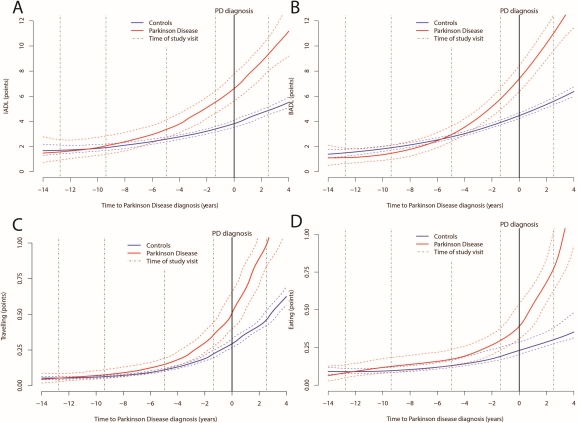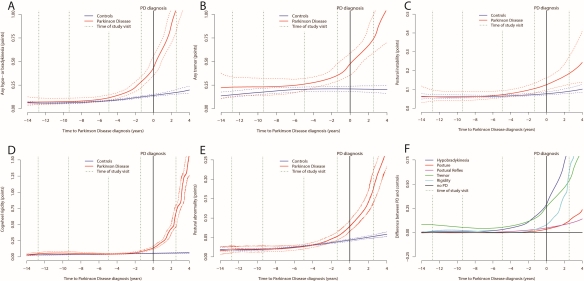Session Information
Date: Monday, June 20, 2016
Session Title: Epidemiology
Session Time: 12:30pm-2:00pm
Location: Exhibit Hall located in Hall B, Level 2
Objective: We studied trajectories of daily functioning and motor and nonmotor features during 14 years preceding clinical Parkinson’s disease (PD) onset.
Background: In the ten years preceding clinical diagnosis a range of motor and nonmotor features become increasingly prevalent in PD patients. However, to date, no study has been published on long-term trajectories of prediagnostic features using data that were repeatedly and consistently assessed in both PD patients and controls.
Methods: We performed a nested case-control study within the prospective, population-based Rotterdam Study. Between 1990 and 2011, we repeatedly assessed daily functioning as well as presence of potential prediagnostic motor and nonmotor features of PD, including cognition, mood, and autonomic function. During follow-up, 107 individuals were diagnosed with PD and each was matched to 15 controls based on age and sex (total n=1712). We then compared prediagnostic trajectories of daily functioning and other features between PD cases and controls.
Results: From six years before diagnosis onwards, prediagnostic PD cases more commonly had problems in instrumental activities of daily functioning, and more frequently showed signs of movement poverty and slowness. This was followed by cognitive deficits and tremor four years before clinical onset. In the last three years, PD cases developed additional motor features (postural instability, cogwheel rigidity, and postural abnormalities) and increasingly reported problems in basic daily activities.
This was followed by cognitive deficits and tremor four years before clinical onset. In the last three years, PD cases developed additional motor features (postural instability, cogwheel rigidity, and postural abnormalities) and increasingly reported problems in basic daily activities.  Although PD cases also increasingly reported anxiety symptoms, depressive symptoms, and use of laxatives throughout study follow-up, differences with controls only became significant close towards diagnosis.
Although PD cases also increasingly reported anxiety symptoms, depressive symptoms, and use of laxatives throughout study follow-up, differences with controls only became significant close towards diagnosis.
Conclusions: PD patients develop impairment in instrumental daily functioning as early as six years before clinical onset, as signs of hypo- and bradykinesia, tremor, and cognitive decline gradually arise. In the last years before clinical onset, impairment in daily functioning further extends to physically oriented tasks as additional prediagnostic features become evident.
(Still to be confirmed: 68th AAN Annual Meeting; April 15-21, 2016; Vancouver Convention Centre, Vancouver, BC, Canada). KEYWORDS; Parkinson’s disease, Cohort study, Prediagnostic study (none of these key words were listed in the next screen).
To cite this abstract in AMA style:
S. Darweesh, V. Verlinden, B. Stricker, A. Hofman, P. Koudstaal, M.A. Ikram. Trajectories of prediagnostic functioning in Parkinson’s disease during 14 years before clinical onset [abstract]. Mov Disord. 2016; 31 (suppl 2). https://www.mdsabstracts.org/abstract/trajectories-of-prediagnostic-functioning-in-parkinsons-disease-during-14-years-before-clinical-onset/. Accessed February 25, 2026.« Back to 2016 International Congress
MDS Abstracts - https://www.mdsabstracts.org/abstract/trajectories-of-prediagnostic-functioning-in-parkinsons-disease-during-14-years-before-clinical-onset/
